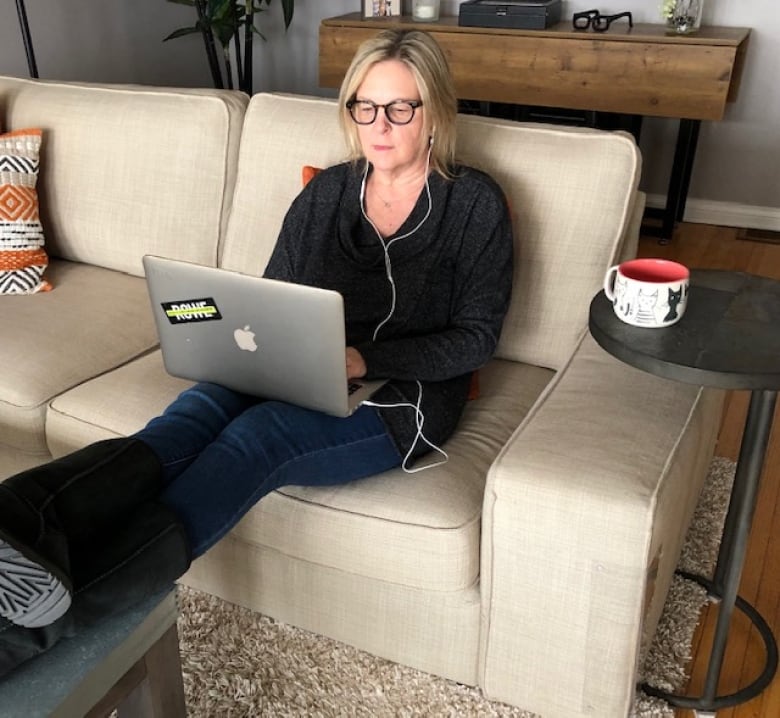Forget 9 to 5. These experts say the time has come for the results-only work environment
Pandemic has made world more ready for unique HR approach, experts say, where employees have more autonomy

A management strategy known as the results-only work environment (ROWE) has seen a surge in interest during the pandemic, says one of the architects of the system.
"I think based on the pandemic companies are more ready now to look at something bold, look at something progressive," said Jody Thompson, who first developed the concept in 2004 with co-founder Cali Ressler when they both worked for electronics giant Best Buy.
LISTEN| Jody Thompson makes the case for a workplace where the clock doesn't matter:

In a results-only work environment, employees have complete control over when, where and how they work. Instead of being tied to a particular location or set of working hours, staff are held accountable for the outcome of their efforts, whether that means meeting a sales target, customer-satisfaction rating or productivity goal.
While a ROWE doesn't necessarily mean employees will opt to work from home that wouldn't suit every job, task or personal preference in many cases, it does involve some degree of freedom about location.
"If I'm clear with somebody about what their measurable results need to be, whether they're in an office or on the moon, it doesn't matter," Thompson told Cost of Living producer Danielle Nerman.

The COVID-19 pandemic has shaken up the world of work, particularly for office employees who were compelled to decamp to makeshift home offices when public health measures first went into effect in March 2020. Since then, numerous companies have embraced remote work, many making plans to downsize office space.
Because of the juggling people have had to do during this time as they coped with things like school closures and elder care, some employees have been given a bit more autonomy over their working hours.
Thompson said this has translated into a measurable increase in inquiries at CultureRX, the Minneapolis-based consultancy she runs with Ressler, mostly from Canadian companies interested in implementing ROWE in their organizations.
The approach hasn't always been well received. After being lauded ona2006 cover of Businessweek for smashing the clock, an article in Maclean's in 2013 declared that ROWE had "flopped." It noted that new leadership at Best Buy had actually scrapped the policy earlier that year, saying that it gave employees too much independence and created a two-tier between the corporate employees and store employees who did not enjoy the same freedoms.
'More feasible, possible, imaginable'
But because COVID-19 has forced "a global experiment" in working from home, the idea of ROWE is no longerahead of its time, like it was when it was first introduced, saidSouha Ezzedeen, an associate professor of human resource management at York University in Toronto, who teaches a graduate-level course on work-life balance.
"It is a lot more feasible, possible, imaginable, accessible because we've practised so much working from home," said Ezzedeen, who holds a PhD in organizational behaviour and development.
"And people have developed ways of working from homesetting up their home office, figuring out how they're going to talk with a team, investing in the technology to support it. Sothere's no going back."
Thompson said a results-only work environment requires a shift in thinking about what it means to manage.
"The manager is not managing 'me' anymore. The manager is managing work. Not me. I don't have to ask permission to go to the dentist. I don't have to say, 'Oh, I'm coming in at nine this morning instead of eight. Is it OK If I go to my child's play?' All of that crap disappears."

Thompson said the organizations they work with have reported higher productivity, increased revenue, reduced turnover, more successful recruitment and better engagement from staff.
One of these is Canadian company Mabel's Labels, which prints custom name tags for kids' clothes and other gear.
Co-founder Julie Cole said the organization worked with CultureRX to institute a formal ROWE policy about a decade ago. It was "a work philosophy that really resonated with us because we started this company as busy moms," she said.
Because those early days involved things like holding meetings over playdates and getting work done after kids were tucked in bed, they knew they could be "very productive at untraditional times," said Cole, who is also the Hamilton-based company's senior director of public relations.
'She got it done. I don't care how'
It made the business more effective and profitable, she said,and the autonomy staff enjoy contributes to better culture and employee retention.
Even the production staff, who must be in the building to print the labels, have been able to enjoy some autonomy over how they work, said Cole, recalling the case of one employee who elected to come in on a holiday Monday to print orders, so she could instead chaperone her child's school trip on the Tuesday that followed.
"Her goal was to get printing done. She got it done. I don't care how."

While the company has not had a formal ROWE policy in place since it was acquired by CCL Industries to operate under its Avery division in 2016, Cole said much of the philosophy still remains.
"When the pandemic hit, our people were already set up. Their tech was set up to work from home," she said. "They were already able to sort of do their work, manage kids. So we didn't have a lot of stress about suddenly not everybody being at the office. It was our time to shine."
Ezzedeen said a lot goes into a well-managed ROWE policy.
"When we say a results-only work environment, it almost sounds like this utopian work systemthat I can completely disappear and just produce the work that you want me to produce.When in factwe have come to better understand, with so much working from home, that there needs to be richer interactions."
Cole said the approachforced her and other leaders at Mabel's Labels to be really clear about goals, priorities and metrics for tracking success.
The reality is that you are actually not getting paid to sit at your desk from eight a.m. to five p.m. You're getting paid to actually get a job done during that time.- Ashley Nunes, Harvard Law School research fellow
"I think, sometimes, with lazy management or lazy leadership, you don't do that. You're just like, 'Oh, everybody's turning up; they're here,' you know.Whereas this forces you to have touchpoints and and make sure these results are happening."
Ashley Nunes, a Harvard Law School research fellow who focuses on work life, said workplaces "should move increasingly towarda product-oriented outcome versus a time-based outcome."
"The reality is that you are actually not getting paid to sit at your desk from 8 a.m. to 5 p.m. You're getting paid to actually get a job done during that time," said Nunes, who is also policy director at the Washington, D.C.-based research institute R Street.
"What we need to do is empower workers to also have the opportunity to perform that work under conditions that maximize their productivity."
Jody Thompson interview produced by Danielle Nerman.












_(720p).jpg)


 OFFICIAL HD MUSIC VIDEO.jpg)
.jpg)



























































































